Bombing Because You Can: An Overview of Airpower
Part I: Strategic and Tactical Theory, the Strategic Bomb Survey, and the Birth of the U.S. Air Force
If bombing targets of legitimate military significance is immoral, then numerous other methods of warfare practiced by all belligerents in the twentieth century are equally immoral. The notion that citizens of a mobilized modern nation-state should be immune from war's suffering is a survival of eighteenth-century military tradition; it is an absurdity that fails to recognize fully all the implications of the modern nation-state in arms or the inevitability of the wider applications of modern military technology. What is immoral, if anything, perhaps, is warfare itself.1 - Melden E. Smith
In the late 19th and early 20th century, war was less becoming a clash between armies than it was a clash between all of society. World War I was the catalyst for this phenomenon. Trench warfare was so destructive and attritional that all the combatants sought alternative ways to win the war and thus harm one another. They would go as far as technology would take them. Poison Gas came into regular use. The submarine and the advent of unrestricted submarine warfare made civilian vessels legitimate military targets by policy. Zeppelin Airships allowed the Germans to drop bombs directly on civilian population centers in France and Great Britain. Some military officers felt uneasy about the changing nature of war; in their mind, war was a phenomenon regulated to professional norms and values, but now that all of society was involved, those rules increasingly went out the window.
The rapid advancement of the aeronautics industry also brought new wonders to the military. The last months of World War I saw the first iterations of air support, strategic bombing, and flight interventions. The military applications of the airplane appeared limitless. Airpower can be defined as the ability of a nation to project military force through aircraft and other aerial platforms. It encompasses various activities, including strategic bombing, air superiority missions, reconnaissance, close air support, transportation, and humanitarian relief operations. Airpower is critical in offensive and defensive military strategies, influencing battlefield outcomes by enabling rapid response, precision targeting, and disrupting enemy forces and infrastructure.
Italian General Giulio Douhet was the first army officer to put those thoughts in writing titled The Command of the Air. He emphasized the strategic importance of gaining and maintaining air superiority. Douhet argued that control of the skies was essential in modern warfare, as it would allow a nation to attack its enemy’s vital centers—such as cities, industry, and infrastructure—while neutralizing the adversary's ability to respond. He believed that aerial bombing, especially targeting civilian populations, could break enemy morale and force a swift surrender, reducing the need for protracted ground operations and minimizing overall casualties. But more than anything, he “offered his thesis as a superior alternative to the insensate bloodbaths of World War I which destroyed the real fruits of victory in the pursuit of the mere symbol of victory.”2 His book was a hit among other European military officers interested in the airplane and seeking to avoid the horrors of trench warfare. It was quickly translated into English, which led to its adoption by the U.S. Air Corps. Billy Mitchell, the American Air Force commanding officer in France during World War I, became the American version of Douhet.
Mitchell told his proclamations to anyone who would listen. He was so staunch in his beliefs and creating a brand that one historian would remark that he became the “patron saint of victory through airpower.”3 There were some recipients throughout the United States, most of whom were still traumatized by the slaughter of the First World War. If air power could make that avoidable, it would be worth listening to. When he was court-martialed over the handling of the Navy's first helium-filled rigid airship, Shenandoah, crashing in a storm in September 1925, killing 14 of the crew and the loss of three seaplanes on a flight from the West Coast to Hawaii, he made sure to make the trial a show. Hap Arnold, the Air Services chief public relations officer at the time, said that Mitchell “wouldn’t rest until he became a martyr.”4 He was convicted of making insubordinate public statements and suspended for 5 years. He resigned from the army and took his crusade on the road.
Mitchell advocated strategic bombing, a military tactic targeting an enemy’s critical infrastructure, industries, and civilian resources to weaken their war-making capability and morale. He believed strategic bombing would bring wars before a navy at sea or army on land could strike a decisive blow. He created a group of prodigies that became known as the “Bomber Mafia” who would go on to the senior leadership roles in the AAF during World War II. The technological advancements embodied in the B-17 bomber were the realization of his dream. The Air Corp Tactical school was adamant that “a well-planned and well-conducted air attack, once launched, cannot be stopped.”5 World War II would test that thesis.
The Strategic Bombing campaign in the European and Pacific theaters was impressive and costly. In the European theatre, British and American tactics for strategic bombing diverged in critical ways. The British Royal Air Force (RAF) focused on nighttime area bombing, targeting entire cities to break civilian morale and disrupt industrial production. The British strategy of night bombing was the brainchild of RAF Officer Sir Arthur “Bomber” Harris, who embraced many of Douhet’s ideas, quipping, “There are a lot of people who say that bombing can never win a war. Well, my answer to that is that it has never been tried yet.” The British cabinet agreed that the RAF would aim to destroy 58 German cities and “dehouse” 22 million German civilians.6
Conversely, American bombing policy focused on daylight, high-altitude “precision” bombing of crucial industrial and support targets, a strategy developed in the 1930s at the Air Corps Tactical School (ACTS). In practice, this aimed to destroy factories, oil refineries, and transportation hubs, though precision was often difficult to achieve despite the invention of the Norden Bomb Sight. Intelligence reports, incorporating analysis from the Committee of Operations Analysts (COA) and the Office of Strategic Services (OSS) and aerial reconnaissance and economic assessments, guided target selection by identifying what the RAF and AAF believed were strategic vulnerabilities to be exploited. At its peak, Allied bombers were hitting targets in Germany every single day, an impressive operational tempo. Together, these complementary strategies aimed to weaken the Axis war effort by overwhelming its air force, infrastructure, and economy from the air.
In the Pacific Theater during World War II, U.S. strategic bombing focused on destroying Japan’s industrial capacity and undermining civilian morale. The effort took a while to ramp up owing to a combination of distance and time to build squadrons of the B-29 Superfortress. It wasn’t until January 1945 that large-scale bombing was undertaken.7 Initially, the Army Air Force targeted factories, ports, and infrastructure with precision bombing. However, due to challenges such as weather and a limited target package, the strategy shifted to area bombing using incendiary bombs. The B-29 Superfortress bombers conducted massive firebombing raids all across the country, including the devastating Tokyo raid in March 1945, which killed over 100,000 people and destroyed most of the city.8 This campaign culminated in the dropping of atomic bombs on Hiroshima and Nagasaki, forcing Japan’s surrender and ending the war.9
Over the course of the war, the Allies dropped 2.6 million tons of bombs on Germany at a cost of over 40,000 bombers and at least 160,000 airmen. In Germany, approximately 3.6 million dwelling units—about 20% of the total in the country—were destroyed or severely damaged, making 7.5 million people homeless in addition to 1 million civilian casualties.10 In Japan, there were nearly 800,000 civilian casualties and 3 million buildings destroyed. The campaign drove 8.5 million people into the countryside, severely taxing the socio-economic situation in the country.11
Senior leadership, particularly in the USAAF, never lost faith that their efforts didn’t significantly impact the Allied war effort. In late 1944, Secretary of War Henry Stimson, in response to a directive by President Roosevelt, put together a survey team to assess the damage done to targets as the Allied armies took control of them. Most survey members were influential civilian academics and businessmen with little to no military experience.12 Only one prominent Air Force officer, General Orvil A. Anderson—formerly of the Air War Plans Division—held a position of some influence, and even that was limited to an advisory role. The survey team analyzed Axis records, Japanese and German officials were interrogated, and teams on the ground conducted damage assessments. Ultimately, a total of 1,000 civilian and military officials contributed to the survey, which consisted of 316 volumes covering both theaters, amounting to thousands of pages; the survey was one of the most impressive and thorough assessments undertaken by the United States government in its history. One analyst predicted that the study would render the bombing campaign “the most brilliantly illuminated campaign in history.”13 Another historian would remark that the strategic bombing campaign was the “most scrutinized military operation in history.”14
The extensive analysis led to numerous contradictions within its volumes, causing the United States Strategic Bombing Survey (USSBS), as it was officially named, to become embroiled in controversy almost immediately upon publication. As one historian would observe, “the survey has readily adapted itself to the wide range of arguments found in this amalgam of postwar writings.”15 The summary report stated that
Allied air power was decisive in the war in Western Europe. This inevitably suggests that it might have been employed differently or better in some respects; nevertheless, it was decisive. In the air its victory was complete; at sea, its contribution, combined with naval power, brought an end to the enemy's greatest threat - the U-boat; on land, it helped turn the tide overwhelmingly in favor of Allied ground forces” but also that German morale was not all that affected by the bombing.16
While the survey was adamant about its military impact, particularly in the European theatre, other evidence suggested it was not as helpful. The survey was subtly critical of the bombing campaigns in the Pacific, believing that the Air Force had gone overboard with the firebombing campaigns.17 They also thought that the conventional strategic bombings weren’t helpful stating that they,
Contributed a substantial percentage to the overall decline in Japan's economy, in many segments of that economy their effects were duplicative’ because of the naval blockade. Most of the oil refineries were out of oil, the alumina plants out of bauxite, the steel mills lacking in ore and coke, and the munitions plants low in steel and aluminum.18
In other words, the urban attacks destroyed inactive factories and killed workers who were already unemployed, adding minimal military impact to the overall war effort. At the same time, a different volume of the survey stated that the bombing campaigns in the Pacific “produced great social and psychological disruption and contributed to securing surrender before the planned invasion.”19 One particular vote of confidence in the bombing campaign was that the survey authors speculated that, even without the atomic bomb and the Soviet declaration of war, Japan would “in all probability” have surrendered before November 1, 1945, and definitely by December 3, 1945.20 These conflicting assessments reflect the complexity of evaluating the true impact of strategic bombing, leaving its role in hastening the end of the war subject to continued debate and interpretation.
The debate over the strategic bombing campaign was roughly divided into three camps: the “Survey Truthers,” “Survey Deniers,” and “in-betweeners.” Each group passionately defended its perspective, turning postwar analysis into a battleground of narratives, with retired generals, historians, and former policymakers vying to shape the legacy of airpower's role in the Allied victory.21
The most prominent denier on the survey team was John Galbraith, a Harvard professor and economist, who would claim that the survey chairman’s office had written a glowing summary of the strategic air war against Germany despite reservations amongst survey members.22 He would write in his memoirs that the strategic bombing campaign was “a disastrous failure.”23
One of the most troubling conclusions Galbraith and his economic team presented was that strategic bombing from 1943 into early 1944 may have streamlined the German economy rather than harmed it.24 However, one might argue that around this time, battlefield setbacks in North Africa, Italy, and the Soviet Union finally spurred Germany to put its economy on a total war footing, which merely coincided with the increase in Allied strategic bombing.25 The survey seemed to align with the later explanation, stating preemptively,
If the bombing of Germany had little effect on German production prior to July 1944, it is not only because she had idle resources upon which to draw, but because the major weight of the air offensive against her had not been brought to bear. After the air war against Germany was launched on its full scale, the effect was immediate.26
Whatever the survey did say, there were still other deniers. George Ball, who served as Under Secretary of State in the Kennedy and Johnson administrations, also thought the strategic bombing achievements were exaggerated and generally ineffective. This profoundly influenced him when he expressed skepticism about the Rolling Thunder Campaigns during the Vietnam War.27 Interestingly, some military officials were deniers. This included Rear Admiral Ralph Ofstie, who thought that for all the resources and cost, strategic bombing achieved practically nothing. However, it should be noted that he was incentivized to discount the effect as a naval officer, given the budget fights looming after the war.28
Most of the deniers base their argument on the fact that German war production increased in 1944-1945, even as the Allied air offensive reached its peak in bombs dropped, and that Germany only surrendered once the Allied armies had fully occupied the country. Most German leaders interrogated after the war were adamant that the bombing did not affect German morale or the economy. Still, it was difficult to measure because this sentiment among German military and civilian officials after the war may have been rooted in pride than hard data. For example, after the first major German city, Hamburg, was destroyed in July 1943 in an RAF raid, killing 26,000 German civilians and most of the city’s buildings, Albert Speer, Minister of Armaments, told Hitler that if six more German cities got hit in the same way, the war would promptly be lost.29 Further evidence suggests that German officials seriously feared the potential the strategic bombing campaign would have on the war effort and thus devoted an increasingly large percentage of its limited resources. Whatever contradictions the evidence presented, at the very least, Bill Mitchell and the Bomber Mafia’s provocations that strategic bombing as a way to win wars outright were exaggerated, which may have influenced some of the denier's conclusions.
The Survey's conclusions about the decisiveness of air power in the Summary Reports were mainly backed by most of the uniformed military who had paid a tremendous cost to wage the campaign; the idea that their sacrifices might not have been worth it would have been a bitter pill to swallow. Colonel Guido Perera, the onetime head of the Committee of Operations Analysts and later a survey chairman's staff member, was responsible for editing the summary reports that emphasized the campaign’s success.30 Many survey deniers, including Galbraith, would point to him as the chief culprit for warping the survey findings.31 Perera would deny this, arguing in his memoirs that the summaries were written and analyzed through the lens of the AAF’s objectives, which, in his view, were to pave the way for the ground invasion, which was ultimately successful.32 The data does back this up. In the early stages of the war, in 1940, the offensively focused German war machine allocated only 17 percent of its aircraft production to single-engine fighters, a figure that rose to 76 percent by late 1944, almost all of which was devoted to trying the Allied onslaught from the air.33 Even with the increase in aircraft production, by the spring of 1944, the Luftwaffe had a grand total of 380 operational aircraft on either the Eastern and Western front to stop a combined 17,000 Allied and Soviet aircraft supporting Operation Overlord and Operation Bagration.34 The Second Schweinfurt raid in late 1943, when the bombing campaign was at its low point, saw 67 percent of ball bearing production taken out, a blow that the German war economy never really recovered from.35 Additionally, the bombing consumed many German material resources, preventing their use in offensive operations. These were tangible and measurable effects of the strategic bombing campaign.
The “Inbetweeners” mainly were civilian and military officials directly involved in defense policy after the war. They argued that some strategic bombings were highly effective while others weren’t. Bernard Brodie, one of the early thinkers of American nuclear strategy, was one of these. He thought that targeting German military infrastructure, including rail yards, airplane manufacturing plants, and the oil fields in Ploiești, Romania, was absolutely crucial but believed that bombing urban centers was “an inordinate waste of bombs and bombing effort.”36 His conclusions were crucial in shaping his thinking of American nuclear strategy, believing that military targets should be the highest priority and most effective than indiscriminately targeting Soviet cities as the military would want.37 Burton Klein, John Galbraith’s assistant, didn’t go as far as his boss, arguing that strategic bombing was decisive but only reduced Germany's military ability to resist the Allied ground offensives. General Hoyt Vandenberg, commander of the 9th Air Force, the principal air command supporting Allied Ground troops, was annoyed that their efforts were not mentioned in the survey.38 Unsurprisingly, he thought tactical air support was much more impactful in the war. However, unlike many deniers, he didn’t want to go against his institution by insinuating that it was an outright failure.
Even the historiography of the Strategic Bombing Campaign and Survey is marked by controversy. One historian argued that the bombing campaign was “second in strategic importance only to the Red Army’s defeat of the Wehrmacht and the great Western invasion of 1944.”39 Adam Tooze, the economic historian, would write that eventually, “the bombers were unstoppable” when it came to wrecking the German war economy.40 On the opposite end, David Halberstam’s Pulitzer Prize-winning account of American involvement in Vietnam, The Best and the Brightest, claimed that the Allied bombing of Germany during World War II was “surprisingly ineffective” and actually “rallied German morale and boosted industrial production.”41 Despite the controversy, supporters and critics of the campaign and survey all have valid points. As historian Gian Peri Gentile best summarized, “The U.S. Strategic Bombing Survey should not be represented as an unimpeachable authority, as has frequently been done, but as a collection of interpretations, subject to close reading, rigorous scrutiny, and thoughtful challenge.”42
While there was and remains controversy on the campaign and survey, there is no doubt that the bombing campaigns set the stage for creating a United States Air Force as an independent branch. It quickly became the most critical and well-funded branch of the United States Military. Charged with managing and delivering nuclear weapons, it quickly came to dominate and influence every central policy question facing the United States. Interestingly, the Air Force didn’t make any structural changes to its conventional doctrine. If anything, they saw the survey’s conclusions as mere musings of civilian academics and businessmen—hardly the kind of analysis the Air Force should heed, nor from people who knew the first thing about waging war.
The Korean War only revealed what some of the USSBS data showed, hinting that strategic bombing could only achieve so much. When the war broke out in June of 1950, the Air Force immediately undertook tactical and strategic bombing campaigns to support UN forces and destroy the North Korean capacity for war. However, by September, only 3 months into the war, the Air Force had bombed all the targets on its list in North Korea. By that point, the tide had turned on the ground, but it didn’t bring the conflict to an end as China decided to intervene. The Air Force, only 3 years into being an independent branch, was already faced with a crisis of identity; if they could not make a strategic impact, were they only valuable for a tactical role?
The Korean War exposed the limitations of strategic bombing and challenged the Air Force’s belief in airpower’s decisive potential. Despite early successes in disrupting North Korean supply lines and providing crucial tactical support to ground forces, the inability to prevent Chinese intervention or compel a swift resolution further exposed the limits of air campaigns in achieving strategic or political objectives. By exhausting its target list within months, the Air Force was forced to confront a harsh reality: victory in modern warfare required more than air supremacy. This dilemma triggered an identity crisis for the newly independent branch, raising questions about its broader role in national defense.
This identity crisis was resolved quickly; the Air Force decided to prepare itself for nuclear war. The Cold War was on, but it could turn hot anytime. The Air Force would play the role, really the only role, in a theoretical nuclear war with the Soviet Union. The group in charge of the strategic bombing force was Strategic Air Command (SAC), which became the most influential and financed command in the United States Military. Again, the lessons of Strategic Bombing, both in practice and in the survey, diverged. In the minds of civilians, nuclear weapons had a rational application, and if they were used in war, they had to be used in a way that had an endgame, not the all-in approach that dominated the thinking of SAC. What was the point of war if not to achieve something? Where was the logic in defaulting to Armageddon? When Bernard Brodie got a look at the SAC’s and Pentagon’s plans for war with the Soviet Union, he was mortified. There was no logic, it appeared the goal was to drop as many nuclear weapons as possible on as many targets as possible at the fastest possible opportunity. The people in this space attracted confident, hardheaded men who often told military planners directly to their faces and anyone who would listen that their plans were dumb. This debate falls outside the scope of this piece but is essential in the context of the lessons and doctrine of strategic bombing and airpower that developed after World War II and Korea.
The strategic bombing campaigns of World War II remain a deeply contested aspect of military history, illustrating the complexities of modern warfare and the challenges of evaluating success. While the campaigns inflicted immense damage and contributed to the eventual collapse of the Axis powers, they also highlighted the limitations of air power, particularly in shaping civilian morale and achieving swift victory. The U.S. Strategic Bombing Survey, despite its ambition, produced mixed and sometimes contradictory findings, fueling ongoing debates among military leaders, economists, and historians. Ultimately, the campaigns demonstrated both the potential and the pitfalls of strategic bombing, influencing the development of American air doctrine and justifying the establishment of the U.S. Air Force as an independent branch. Yet, even as air power became central to U.S. military strategy, the all-knowing bombing survey parted with a warning,
No greater or more dangerous mistake could be made than to assume that the same policies and practices that won the War in Europe will be sufficient to win the next one if there be another. The results achieved in Europe will not give the answer to future problems; they should be treated rather as signposts pointing the direction in which such answers may be found.43
References
Brodie, Bernard. 1955. "Some Notes on the Evolution of Air Doctrine." World Politics, Vol. 7, No. 3 349-370.
Brodie, Bernard. 1950. "Strategic Bombing: What can it do?" The Reporter 28-31.
Citino, Robert. 2017. The Wehrmacht’s Last Stand: The German Campaigns of 1944-1945. Lawrence: University Press of Kansas.
Galbraith, John Kenneth. 1982. A Life in Our Times. New York: Random House Publishing Group.
Gentile, Gian Peri. 1997. "Advocacy or Assessment? The United States Strategic Bombing Survey of Germany and Japan." Pacific Historical Review, Feb., 1997, Vol. 66, No. 1 53-79.
Halberstam, David. 1973. The Best and the Brightest. New York: Ballantine Books.
Holland, James. 2018. Big Week: The Biggest Air Battle of World War II. Grove Press: New York.
Kaplan, Fred. 1991. The Wizards of Armageddon. Stanford: Stanford University Press.
Melden E. Smith, Jr. 1977. "The Strategic Bombing Debate: The Second World War and Vietnam." Journal of Contemporary History, Vol. 12, No. 1 175-191.
Miller, Donald. 2006. Masters of the Air. New York: Simon & Schuster.
Trainor, Michael R. Gordon and Bernard. 1995. The Generals' War: The Inside Story of the Conflict in the Gulf. New York: Back Bay Books.
Tooze, Adam. 2006. The Wages of Destruction: The Making and Breaking of the Nazi Economy. New York: Penguin Books.
United States Strategic Bombing Survey. Washington: War Department. 1945.
Werrell, Kenneth P. 1986. "The Strategic Bombing of Germany in World War II: Costs and Accomplishments." The Journal of American History, Vol. 73, No. 3 702-713.
Melden E. Smith, Jr. "The Strategic Bombing Debate: The Second World War and Vietnam." Journal of Contemporary History, Vol. 12, No. 1 (1977): 184.
Bernard Brodie. "Some Notes on the Evolution of Air Doctrine." World Politics, Vol. 7, No. 3 (1955): 360.
Michael R. Gordon and Bernard Trainor. The Generals' War: The Inside Story of the Conflict in the Gulf (New York: Back Bay Books. 1995), 96.
Quoted from Donald Miller, Masters of the Air (New York: Simon & Schuster, 2006), 37.
Ibid., 41
Adam Tooze, The Wages of Destruction: The Making and Breaking of the Nazi Economy. New York: Penguin Books (2006), 510.
The B-29 Superfortress was the most expensive American defense project during the war, costing $3 Billion.
See William W. Ralph, “Improvised Destruction: Arnold, LeMay, and the Firebombing of Japan.” War in History 13, no. 4 (2006): 495–522, on the evolution of American bombing policy in the Pacific Theatre.
Recommend Robert A. Pape, “Why Japan Surrendered.” International Security 18, no. 2 (1993): 154–201.
United States Strategic Bombing Survey, Summary Reports (Washington: War Department, 1945), 6. Hereby cited as USSBS with volume titles.
Ibid., 92-94.
Some members included Paul Nitze, who went on to a 40-year government career in national security; Monroe E. Spaght, later manager of Shell Oil Company; and Henry C. Alexander, President of JP Morgan Bank.
Bernard Brodie, "Strategic Bombing: What can it do?" The Reporter (1950): 28.
Miller, 470.
Gian Peri Gentile, "Advocacy or Assessment? The United States Strategic Bombing Survey of Germany and Japan." Pacific Historical Review, Vol. 66, No. 1 (1997), 54.
USSBS, Summary Report: European War, 37.
Survey members in the Pacific criticized Curtis LeMay and the AAF leadership at the time but weren’t in a position to influence policy.
USSBS, Summary Report: Pacific War, 18.
USSBS, The Effects of Strategic Bombing on Japanese Morale, 1.
USSBS, Japan's Struggle to End the War, 10.
USSBS, Summary Report, 37.
John Kenneth Galbraith, A Life in Our Times (New York: Random House Publishing Group, 1982), 184.
Ibid., 270.
Gentile, 61.
Smith makes this argument, see The Strategic Bombing Debate, 179-180.
USSBS, Summary Report: European War, 71.
The Rolling Thunder campaign will be the focus of Part II.
When it came to the Pacific theatre, many Navy officers argued that a blockade would have been a better strategy than the firebombing campaigns.
James Holland. Big Week: The Biggest Air Battle of World War II (Grove Press: New York, 2018), 85.
Gentile, 60.
See Galbraith’s USSBS report, Effects of Strategic Bombing on the German War Economy.
Gentile, 60.
Kenneth P. Werrell, "The Strategic Bombing of Germany in World War II: Costs and Accomplishments." The Journal of American History, Vol. 73, No. 3 (1986): 710.
Robert Citino, The Wehrmacht’s Last Stand: The German Campaigns of 1944-1945 (Lawrence: University Press of Kansas, 2017), 161, 171.
Miller, 211.
Brodie, “Strategic Bombing, What can it do,” 30.
Some historians argue that Brodie and Patrick Blackett, another early nuclear strategist, merely used the USSBS to advance their ideas on American nuclear policy, see Gentile, 54.
Fred Kaplan, The Wizards of Armageddon (Stanford: Stanford University Press, 1991), 38-41.
Miller, 470.
Tooze, 651.
David Halberstam, The Best and the Brightest (New York: Ballantine Books. 1973), 600-601.
Gentile, 79.
USSBS, Summary Report, European War, 40.




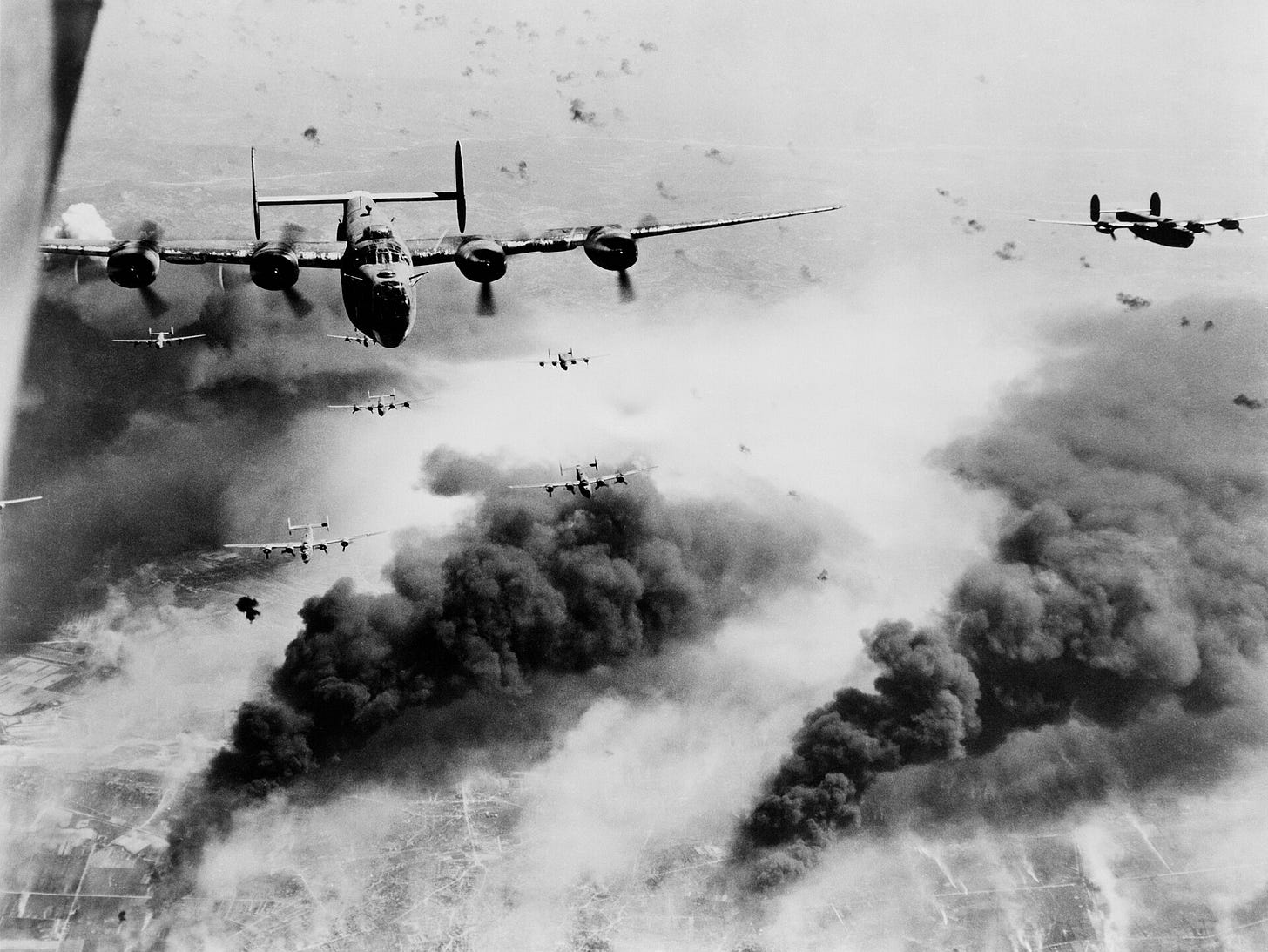
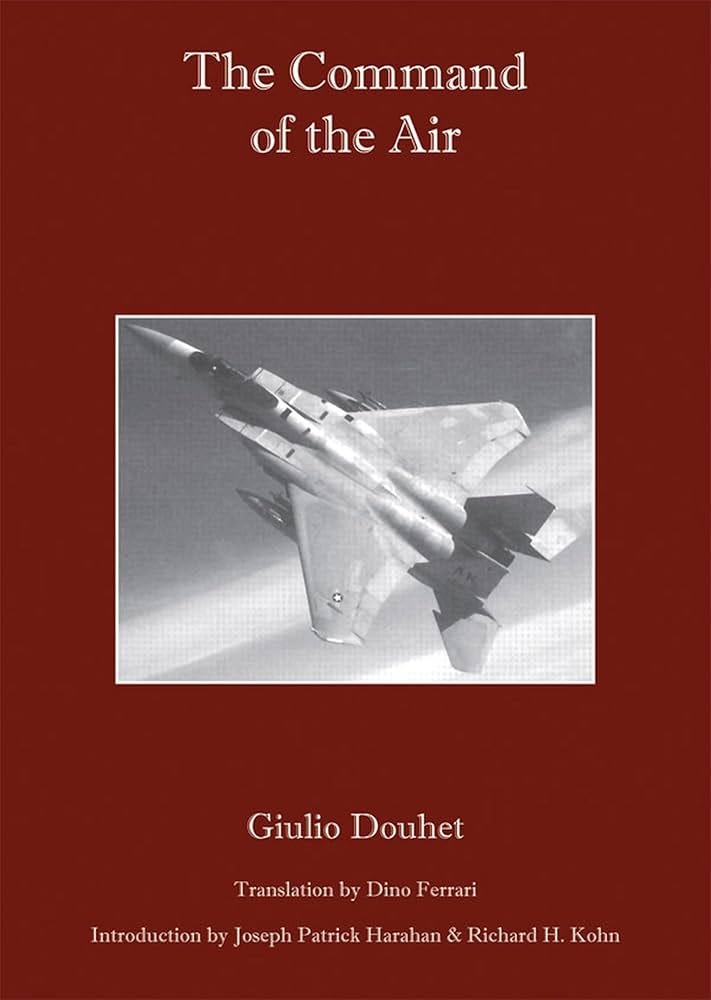
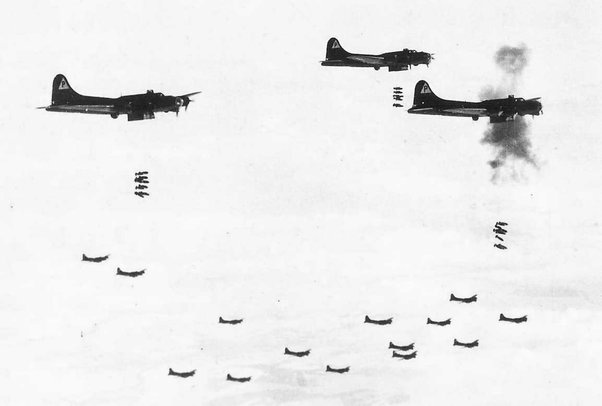
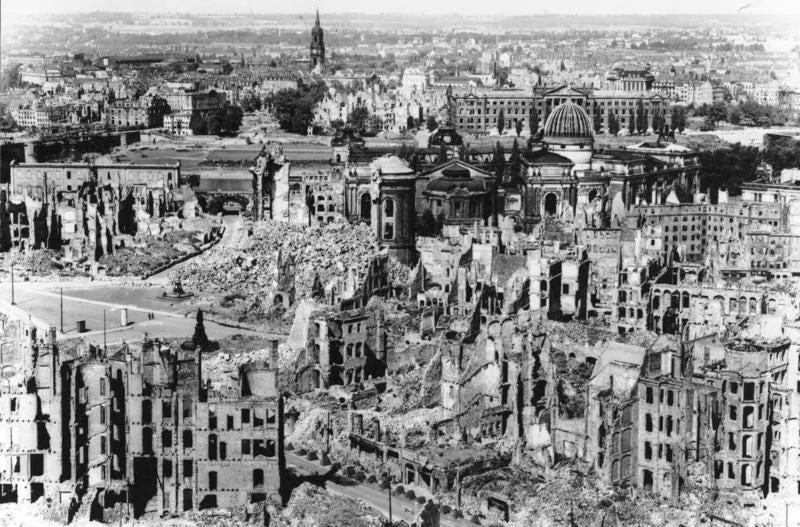
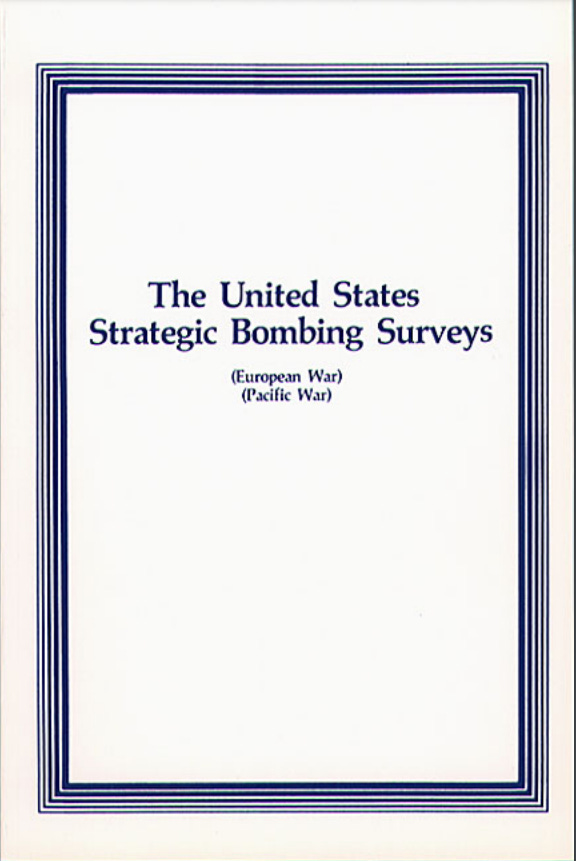

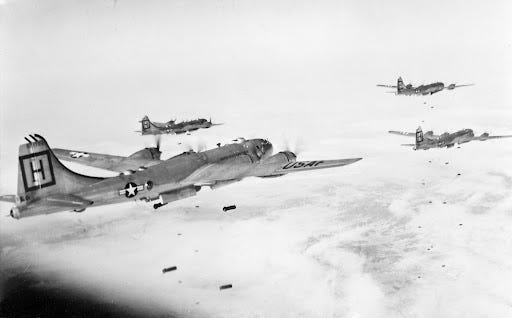
Agreed, a good summary of WWII AirPower. Phillips Payson’s “How the war was won” also makes a good argument that air and sea power were the decisive factors in defeating the Axis powers. Land battles not so much.
Well researched and written. In my highly un-expert opinion, the strategic bombing campaign in the ETO caused hundreds and hundreds of German 88s, their crews, and supply and support network, and related energy to be diverted from the front to defend civilian and industrial targets in the Fatherland. The same could be said for fighters needed for interception instead of imposing air superiority over whatever front. A similar expense in material, manpower, and energy was required to harden production facilities and construct them in inconvenient locations subject to transport disruption by the same bombing campaign. In my mind, it’s about which side could best bear this expense in terms of manpower, brainpower, material, and energy.
The allies had a steady stream of aircraft and crews. The Germans did not. The allies could invest in new technologies related to air war without greatly impacting investment elsewhere. The B-29 is the prime example. The Germans had the Me-262 etc but could only just make it work and it was at great cost both in terms of material but also in the tremendous expense and energy in building underground factories. Add to that the difficulty in finding and training pilots that could handle the new jets.
When I read these reports it seems to me the writers are taking a Taylorism approach as they might to the direct costs of production of a Buick. Yes, German production increased late in the war but at what cost? I bet if you compared the total cost of building a tiger in 1943 to the cost in 1945 the latter cost would be completely unsustainable, if you include all direct and indirect costs incurred. Cost includes energy expended.
Just my partially informed opinion. Thanks for taking the time and care to write such an interesting article.
PS: Have you read or written anything about the impact of energy on the war effort? Not just oil wells, tankers, and refineries but the overall energy/work of waging modern war? The allies had relatively easy and inexpensive access to energy in all its forms. It was barely a limitation. On the other hand, the Germans increasingly relied on slave energy/labor to create and operate their underground factories, for example.